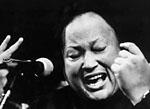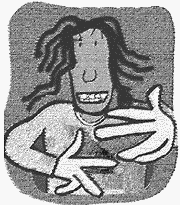HERE IN THE year 2000, the idea that music can touch people around the world without losing its ties to a specific culture is almost commonplace. After all, we live in an era when Israeli soldiers travel to the west coast of India to hear trance music that was introduced by British people who brought it from Detroit. But it is worth taking time to reflect on how recent a development this truly is. When Nusrat Fateh Ali Khan, the superstar of Pakistani Qawwali music, died in 1997, he was still considered a radical for promoting music as an international language. Nevertheless, when Magic Touch, an album of electronic remixes of his songs, is released next month, it will not seem at all like a novelty. This is no accident—Nusrat Fateh Ali Khan was a tireless missionary, both for Sufism (which he believed in with all his heart) and for music.
It’s fall 1993, and I am seated on the floor of my professor’s living room, trying to sing Qawwali with a group of about eight other students. Since we don’t have any instruments handy, we take the karaoke approach, awkwardly trying to sing along with a video of a concert by Nusrat Fateh Ali Khan. Why are we bothering? Because Nusrat—who is sitting on the couch—has asked us to.
Every once in a while video-Nusrat will rip out an amazing run, a flood of notes that would have Patti LaBelle gasping for breath. We turn to real-Nusrat and applaud. Every once in a while, we barely manage to get through one of the verses that he taught us the previous year, and real-Nusrat applauds us (and, to a lesser degree, his video self). At first, it is a strange act of social balancing, trying to respond simultaneously to two incarnations of the same master: one immediate, the other separated in space and time. Soon, though, it becomes natural, like when you’re spinning around and all of a sudden it seems like you’re standing still and it’s the world that’s spinning. It’s like that—like the music is a separate object that we’re all revolving around. It is a surreal and beautiful moment.
I FIRST MET Nusrat in 1992, when he joined the faculty of the University of Washington’s ethnomusicology department as a visiting artist. As a first-year grad student, I had eagerly signed up for lessons with him. No one knew what to expect. We could hardly believe someone of his stature would even show up. But he did a lot more than that.
Nusrat Fateh Ali Khan was raised in a family of Qawwals—singers of traditional Sufi music. Although his father, Ustad Fateh Ali Khan, wanted him to have a more conventional career, Nusrat showed such talent at an early age that his father relented and trained him in the music. It wasn’t long after he started performing at shrines dedicated to Sufi saints that his fame began to spread throughout Pakistan and the rest of Asia. His talent for interpreting the music of the Muslim mystics was unparalleled, and his powerful voice and ability to improvise long, elaborate phrases could appeal to humans of any religious background.
But it wasn’t just technical skill that led Nusrat to world fame. His own personal devotion manifested itself in an almost boundless emotional depth that can be heard in the world’s greatest singers: Egypt’s Umm Kalthum, Detroit’s Marvin Gaye, South India’s M.S. Subbalakshmi, Harlem’s Billie Holiday, and a handful of others. Nusrat welcomed you in and took you places. At one of his concerts, a friend of mine noticed that his pulse was beating in time to the music. This does not happen with the Backstreet Boys.
Nusrat also had the benefit of working in a particularly nontraditional tradition. The texts of most Qawwali songs are based on Sufi poems, most of which are spiritual allegories that speak in code about religious ideals. To attain momentary oneness with the divine, for instance, is often described in terms of getting drunk. Its lyrics use the profane to describe the sacred. The embrace of such foreign elements as synthesizers, breakbeats, and Eddie Vedder (with whom Nusrat dueted on the soundtrack to the film Dead Man Walking) is therefore to be expected, even celebrated.
These three factors—the power of a deep tradition combined with a commitment to experimentation and superior individual talent—led to what one of my fellow students characterized as Nusrat’s “extreme fame.” Countless double takes and near-car accidents occurred when Seattle’s South Asian residents would spot him walking down the street. It was like seeing Elvis.
But he actually taught us Qawwali music. Understand, this is like having Mozart teaching fifth-grade band. Nusrat could easily have had someone else teach us the rudiments and then come in to check on our progress every few weeks. But he was totally dedicated to his music, and he taught us day in and day out, note by note, over and over. This was a man who cared deeply, and that was one of the gifts we were left with when he died. The various ego trips of popular musicians just look ridiculous next to the quiet friendliness of Nusrat Fateh Ali Khan.
Now I have an advanced degree in ethnomusicology, and so I have to reject the idea that music is a universal language. Every musical style has its own rules and standards and techniques that you have to understand in order to truly appreciate it. Too often the idea of universal appeal is an excuse for pandering (on the artist’s part) or intellectual laziness (on the fans’ part). And yet the human voice can still possess a power that you don’t have to understand to feel. I know that Nusrat Fateh Ali Khan believed this. I also know that he proved it to me.






